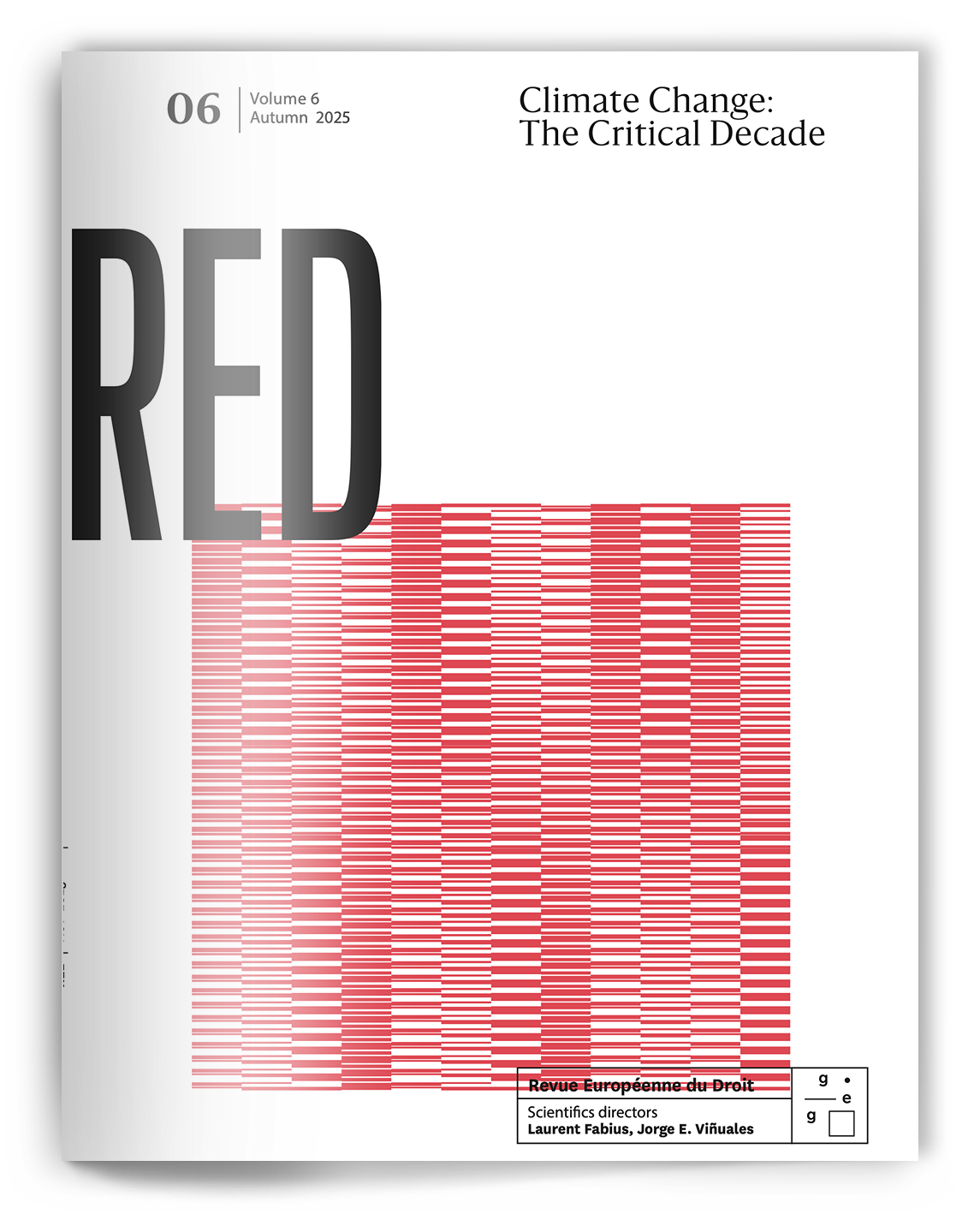Issue
Issue #6Auteurs
Laurent Fabius
A Scientific Journal published by Groupe d'études géopolitiques
Climate Change: The Critical Decade
Ten years since the Paris Agreement.
Like any anniversary, this is an opportunity to take stock of the protection of what is undoubtedly the most significant existential challenge of this century—the climate and the environment—and to consider future prospects. Assessing the current situation and outlining goals for climate and environmental protection ten years after the Paris Agreement: this is the dual challenge the Revue européenne du droit has set for distinguished contributors—presidents of institutions, court leaders, public decision-makers, diplomats, academics, and lawyers—each of whom, in their respective fields, has responded admirably. I want to express my deepest gratitude to them.
In 2015, faced with the urgency and severity of climate change, the international community decided to join forces to forge a major legal instrument that would serve as a universal reference in the fight against climate change, for the benefit of humanity’s prosperity and posterity.
In 2015, France had the privilege of hosting COP21. I remember the somewhat unusual circumstances surrounding this decision. We were in Warsaw in 2013 to decide which country would host COP21 two years later. France was the only candidate, which reflected the somewhat limited enthusiasm at the time for its chances of success. I can still see the embarrassed smiles of the delegates who, when the decision was announced, came up to me and said, “Mr. Fabius, good luck.”
Luck may have played a part, but above all, it was the result of intense diplomatic preparation, which I commend, aided by the alignment of three essential planets: that of scientists, to whom I express my deep gratitude—especially the IPCC— that of civil society—citizens, associations, businesses, cities, and regions—and that of governments, which were united at the time. This crucial combination unfortunately contrasts with the current situation, where science and factual truth are sometimes challenged, even at the highest levels, where civil society is often divided, and where several governments, rejecting multilateralism and favoring force, forget that humus (earth) and humility share a common root, that greenhouse gases do not need a passport, and that, as successive UN Secretaries-General have reminded us, there is no planet B. Those who, in good or bad faith, propose a narrative of failure must be countered with the truth of the facts, which highlight the benefits of the Paris Agreement.
Thanks to the 29 articles and 140 paragraphs of decisions in the Paris Agreement, as well as successive COPs and their implementation, the long-term trend of average temperature rise has been slowed by several decimal points. But each decimal point carries the weight of millions of lives. The decarbonization targets of the Paris Agreement have become a guiding framework for governments, local authorities, businesses, and citizens, with most adopting carbon neutrality goals. Technologies have advanced significantly, the emphasis on adaptation, not just greenhouse gas reduction, has progressed, and funding has been made available.
But—and this is a significant “but”—the facts also show that the world is far from meeting all of the Paris targets and commitments, especially the well-known +1.5°C limit, achieving carbon neutrality by 2050, and the essential responses outlined by COP 21 and subsequent COPs. Adaptation efforts are not yet adequate. The transformation of economies remains incomplete, uneven, and too slow. Funding mobilization falls short of both ambitions and needs. And powerful forces exist that deny scientific evidence and promote dangerous short-term thinking.
The most favorable scenarios envision a target of “net zero emissions” by 2050, which would require very ambitious emission reductions and profound structural changes starting today. The paradox of paradoxes is that several pathways for climate action seem to be reaching a plateau just as climate change and its harmful effects are setting new records.
So, what does the future hold?
As chair of the Circle of COP Presidents, established on the initiative of André Corrêa do Lago, President of COP30, I want to highlight three key messages. First, the Paris Agreement has been and continues to be highly valuable. Second, its implementation has not yet been thorough enough to meet its essential goals. Third, in line with the Agreement, we must strengthen policies to reduce global warming, cut GHG emissions, and adapt to climate change, allocating the necessary resources to achieve this.
If we do not hammer home these three messages simultaneously and quickly translate them into action, we risk not only failing to meet the goals of the Paris Agreement but also allowing the Agreement to be called into question and, as a result, accepting or even exacerbating climate change and its impacts on humanity as a whole.
Among the changes to be made, the famous “transitioning away from fossil fuels,” adopted by COP28 in Dubai, must be respected and enforced, whether it pertains to CO2 or methane emissions. Funding must be increased and clarified, as we are still far from reaching the goal, especially regarding developing countries. Carbon pricing, energy efficiency, and renewable energy sources must continue to gain ground, and social justice should always remain a top priority. Like businesses, local actors play a crucial role. They possess two key characteristics: they concentrate the vast majority of harmful gases within their regions, and it is elected officials, mayors, and governors, including in the United States, who feel and face the challenges of the necessary changes most directly. Finally, there is a strong expectation that policy results be evaluated against the set objectives, based on the progress made and the pace of implementation.
Faced with mounting and looming challenges, Galileo’s warnings in Bertolt Brecht’s eponymous play resonate: “Who does not know the truth, is simply a fool… Yet who knows the truth and calls it a lie is a criminal.” Under these circumstances, it is not surprising that courts and tribunals in an increasing number of countries are punishing violations of environmental law and the requirements of the Paris Agreement.
International justice, through the prominent voices of the European Court of Human Rights, the Inter-American Court of Human Rights, and the International Court of Justice, among others, is also speaking out in strong terms. First, climate change treaties impose strict obligations on states to protect the climate system. Second, states must use all available means to fulfill their climate obligations. Third, failure to do so constitutes an “unlawful act” for which they can be held liable.
I am often asked to summarize the spirit of the Paris Agreement. Ten years later, my answer remains the same: “better, faster, together.” It is this threefold message that we must turn into action.
citer l'article
Laurent Fabius, Foreword, Nov 2025,
à lire dans cette issue
voir toute la revue






